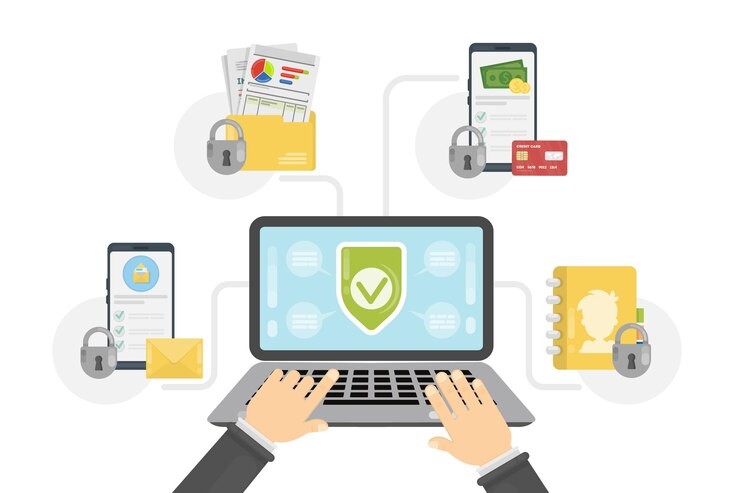About
Solutions
Identify
Protect
Detect
Respond
Recover
News & Events
9 Effective Ways How to Maintain Network Security in Your Company

9 Effective Ways How to Maintain Network Security in Your Company
In today’s digital era, maintaining the security of your company or business's computer network is absolutely critical. The increasing reports of data breaches caused by cyberattacks highlight the urgency of implementing effective strategies to protect your company’s data and IT infrastructure. So, what are the most effective ways to maintain computer network security? Check out the tips and tricks below.
Why is Maintaining Network Security Important?
Before diving into the methods, it’s crucial to understand why securing your computer network and its data is so important.
Simply put, if your network is not secure, your data and information can be easily hacked or stolen by malicious actors. Data breaches and cyberattacks can have devastating consequences. Beyond financial losses from stolen data, your company or business may also lose trust from customers and business partners.
Operationally, protecting your computer network is equally important to prevent disruptions and damage that could interfere with your company’s efficiency and performance. In other words, cyberattacks can lead to operational downtime, directly impacting your company’s productivity.
Effective Ways to Maintain Computer Network Security
After understanding the urgency of maintaining computer network security and its potential negative impacts on a business or company, what steps should be implemented to ensure its protection? Here’s an overview:
1. Regularly Update Operating Systems
Your computer's operating system (OS) needs to be updated regularly. Make sure to perform updates as soon as you receive a notification on your computer. An outdated OS can create vulnerabilities that hackers can exploit to breach and access your network. To avoid disruptions, consider scheduling automatic updates during nighttime or when there is no user activity.
2. Conduct Network Security Audits
Network security audits aim to identify weaknesses that could pose risks. You can either employ an internal IT team or collaborate with a third party to perform a comprehensive assessment. Ensure the audit covers key areas such as firewall configurations, computer assets, security procedures, and other critical aspects.
3. Use Complex Password Combinations
Many companies still use easily guessed passwords, which significantly increases the risk of hacking. To enhance security, create complex passwords with a minimum of eight characters, including uppercase and lowercase letters, numbers, and symbols.
Avoid using personal information that can be easily guessed, such as birthdays. Equally important, use different passwords for each application and consider utilizing secure password manager software to safely store and manage your credentials.
4. Use a VPN (Virtual Private Network)
Next, you can use a VPN (Virtual Private Network), a secure method for connecting to networks by encrypting data traffic. With a VPN, the connection between devices and the network is protected from attacks and unauthorized access.
5. Manage User Access
Set up and manage user access to the network by ensuring that everyone has permissions aligned with their responsibilities. Use strong passwords and enforce a policy requiring regular password changes to enhance security.
6. Implement Security Policies
Companies should have clear and consistent security policies that cover internet usage, password guidelines, and mobile device usage. Additionally, conduct regular security training sessions for all users to ensure awareness and compliance.
7. Install SSL Certificates on Your Website
If your company has a website, install a Secure Socket Layer (SSL) certificate to protect customer data. SSL secures your website and prevents data breaches.
8. Provide Education to Employees
It may seem trivial, but the impact can be significant, as computer network security issues are often influenced by employee ignorance. Therefore, proper education about cyber threats and safe practices when using the network is crucial.
For instance, employees should be reminded to avoid clicking on unfamiliar links in emails that might lead to phishing sites or downloading untrusted files. Awareness and appropriate training can help prevent these risks and strengthen the company’s network defenses.
9. Utilize Advanced Network Security Solutions
For enhanced security, consider using solutions like the Next Generation Firewall (NGFW) from SQURA. NGFW combines traditional firewall technology with advanced security features, including SSL/TLS traffic inspection, threat detection, and granular access control.
In conclusion, maintaining your company’s computer network security requires a comprehensive and integrated approach. By adopting measures such as system updates, strict access management, and data encryption, your company can effectively safeguard its valuable assets against various threats.
In addition, for more advanced solutions, consider network security protection like SQURA NGFW, a next-generation firewall capable of countering sophisticated threats and performing deeper traffic inspection.
As a leading ICT communication service provider in Indonesia for over three decades, SQURA offers advanced technology to protect businesses from increasingly complex cyber threats in the digital world.
With SQURA NGFW, you can ensure that your company's network system is effectively protected and prepared to face future security challenges.

